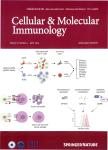Synergistic and feedback signaling mechanisms in the regulation of inflammation in respiratory infections
Synergistic and feedback signaling mechanisms in the regulation of inflammation in respiratory infections作者机构:Center for Inflammation Immunity and Infection and Department of Biology Georgia State University Atlanta GA USA Department of Microbiology and Immunology University of Rochester Medical Center Rochester NY USA
出 版 物:《Cellular & Molecular Immunology》 (中国免疫学杂志(英文版))
年 卷 期:2012年第9卷第2期
页 面:131-135页
核心收录:
学科分类:0710[理学-生物学] 090603[农学-临床兽医学] 071010[理学-生物化学与分子生物学] 1004[医学-公共卫生与预防医学(可授医学、理学学位)] 1002[医学-临床医学] 07[理学] 1001[医学-基础医学(可授医学、理学学位)] 09[农学] 0906[农学-兽医学]
基 金:supported by grants from National Institute of Health
主 题:CYLD negative regulation NF-κB nontypeable Haemophilus influenzae synergistic regulation
摘 要:Pneumonia, the most typical and frequent lower respiratory tract infection (LRTI), is a leading cause of health problems in the United States. Bacteria represent the most prevailing cause of pneumonia in both children and adults. Although pneumonia with a single bacterial infection is common, a significant portion of patients with pneumonia is polymicrobial. This infection is often complexed with other physiological factors such as cytokines and growth factors. Nontypeable Haemophilus influenzae (NTHi) is the most frequently recovered Gram-negative bacterial pathogen in the respiratory system and induces strong inflammatory responses. NTHi also synergizes with other respiratory pathogens, such as Streptococcus pneumoniae and respiratory viruses and pro-inflammatory cytokines, such as tumor necrosis factor-alpha (TNF-α). It is noteworthy that NTHi not only synergizes with growth factors such as transforming growth factor-beta (TGF-β), but also utilizes growth factor receptors such as TGF-β receptor and epidermal growth factor receptor (EGFR), to enhance inflammatory responses. Although appropriate inflammation is a protective response against invading pathogens, an uncontrolled inflammatory response is often detrimental to the host. Thus, inflammation must be tightly regulated. The human immune system has evolved strategies for controlling overactive inflammatory response. One such important mechanism is via regulation of negative feedback regulators for inflammation. CYLD, a multifunctional deubiquitinase, was originally reported as a tumor suppressor, but was recently identified as a negative regulator for nuclear factor-kappa B (NF-κB) signaling. It is induced by NTHi and TNF-α via a NF-κB-dependent mechanism, thereby serving as an inducible negative feedback regulator for tightly controlling inflammation in NTHi infection.



